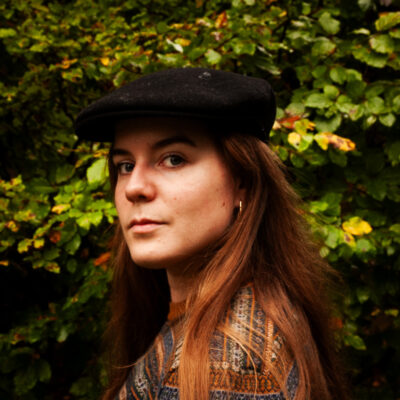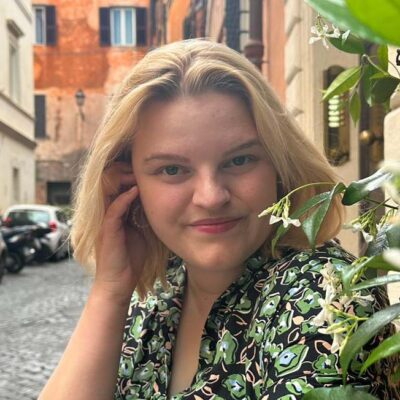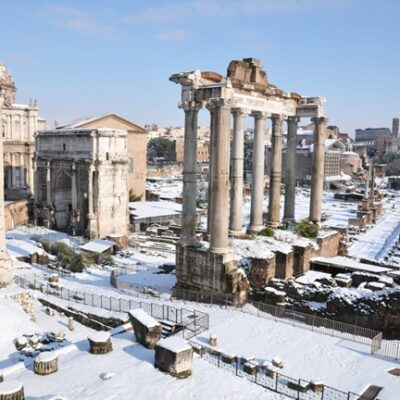KNIR Column La città laboratorio di Storia/storie
Dr. Maria Bonaria Urban
Direttrice degli Studi di Storia
Lavora presso il KNIR: 2021-2023
Indirizzo mail: m.b.urban@knir.it
Numero di telefono: +39 06.326962.31
Disciplina e specializzazione: Storia, Cultura e Storia d'Italia, Letteratura, Studi su cinema, televisione e nuovi media.
Università: Universiteit van Amsterdam
Giorni lavorativi: lunedì, martedì, mercoledì, giovedì, venerdì
Sito web: https://artes.uva.nl/profile/u/r/m.b.urban/m.b.urban.html

Seguimi su
Profilo
Trained in Literary Studies and History in Italy, I am a cultural historian interested in how artistic artefacts and cultural practices mediate narratives of national identity and contribute to shaping a vision of the past, by intersecting cultural production with history, politics and media. In so doing, I have adopted different research methods and a strong interdisciplinary and transnational approach.
I hold a Laurea in Lettere Moderne (1992) from the University of Cagliari (Italy) (cum laude) where I also received my Ph.D in Medieval history (1997) with the thesis Cagliari catalano-argonese. Topografia e insediamento nei secoli XIV-XV. Between 1994-1997, to complete my thesis, I carried out extensive archival research at Archivo de la Corona de Aragón and was affiliated with the Istituto sui rapporti italo-iberici, Consiglio Nazionale delle Ricerche (CNR), Cagliari, Italy [now Istituto di Storia dell’Europea Mediterranea]. In 1995 I also graduated from Scuola di Archivistica, Paleografia e Diplomatica at the Archivio di Stato di Cagliari.
For my Ph.D thesis I explored how the Catalan conquest of the Kingdom of Sardinia (1323) resulted in a new urbanistic plan for the city of Cagliari. Combining urban history, history of ideas and architectural history I reconstructed the transformation of the city within the broader transnational culture and politics of the Corona de Aragón in the XIVth and XVth century. My Ph.D thesis was published in a monograph entitled: Cagliari aragonese. Topografia e insediamento (Pisa, ETS, 2000).
After moving to the University of Amsterdam (UvA) in 2003, my research and teaching shifted toward the modern and contemporary cultural history of Italy. From 2003-2020 I taught BA and MA courses (in Dutch and English) on Italian modern and contemporary history and culture, European literature, Italian cinema, cultural nationalism, migration and postcolonial studies at the Departments of Italian Studies and European Studies at the UvA. In 2008, I was awarded the UvA Lecturer of the Year Prize.
Bringing together my expertise in history, literary and film studies, I have explored the construction of national identity in literature and film through the lens of the “stereotype of the South” between the 19th and 21st century. My research on the cultural construction of the South resulted in two main publications. The first was the co-edited volume Le frontiere del Sud (CUEC 2011). After that, I reconstructed the mediation of Sardinian imagery in European culture between 1800 till the present through a vast and heterogenous body of works in the monograph Sardinia on Screen. The Cultural Construction of the Sardinian Character in Italian Cinema (2013), published by Rodopy in the book series Studia imagologica.
Furthermore, for many years I have been fascinated by the cultural memories of political violence, therefore I have developed a specific interest in the Italian Resistance (1943-1945) and terrorism which has resulted in several articles and book chapters that explore how the partisan war and political violence in the Sixties and Seventies have been mediated in literary and cinematic production. Building on my interest in the dynamics between history, memories and media I have co-edited the volume – Televisionismo. Narrazioni televisive della storia italiana negli anni della seconda Repubblica (Edizioni Ca Foscari’ Digital Publishing Innesti/Crossroads 8, 2015) which explores how Italian television series rewrite national history for a large audience.
My current research projects focus on my long-lasting interest in the history and legacy of fascism and anti-fascism. At the moment I am co-editing a volume on the transnational dimension of fascism and the legacy of anti-fascism in contemporary protest movements in Europe and Latin America. Moreover, I am developing a new research project on the role of the Vatican and Catholic missions in the former Fascist colonies in East Africa between 1941-1956.
Currently I am Director of Studies in History at the KNIR where I do research and teach on the cultural history of modern Italy, heritage and memory, and film studies. Since 2014 I have been a Senior lecturer (UD1) in Italian Studies at the Faculty of Humanities, University of Amsterdam. I am a member of the Amsterdam School for Regional, Transnational and European Studies (ARTES) and the Amsterdam Centre for European Studies (ACES-UvA). Furthermore, I am part of the editorial board of the Journal of Italian Cinema and Media Studies (Intellect) and Book Review Co-Editor of Annali d’Italianistica (JSTOR), after having served as a member of the editorial board of Incontri. Rivista europea di studi italiani and of the Board of the Werkgroep Italië Studies.
Ricerca
My research focuses primarily on Italian cultural history of the 20th and 21st century. Main areas of interests are in contemporary (cultural) history, heritage & memories studies, film and television studies, (post)colonial and migration studies, Imagology, and Sardinian culture. My current research deals with narratives of (anti-)fascism, political violence, and colonialism in written texts and visual media from an interdisciplinary and transnational perspective.
- Transnational Imaginaries and Practices of (Anti-)Fascism(s) and Populism(s)
- Scrivere è (r)esistere: la Resistenza nel romanzo contemporaneo
Televisionismo. Narrazioni televisive della storia italiana negli anni della seconda Repubblica (Edizioni Ca Foscari’ Digital Publishing Innesti/Crossroads 8, 2015) https://edizionicafoscari.unive.it/it/edizioni/libri/978-88-6969-044-0/ (co-edited volume with Monica Jansen)
By ‘televisionism’, this volume means the production of historical television drama that, since the 1990s, has rewritten from a revisionist perspective the key moments of the national past that determined a ‘divided’ memory of the Italian nation. The popular and usable form of fiction promotes the sharing of the past, but could also manipulate the historical truth transmitted. It is on this ambivalence that the contributions analyse the television series produced by Rai and Mediaset.
Sardinia on Screen. The Construction of the Sardinian Character in Italian Cinema (2013)
This volume explores how Sardinians and Sardinia have been portrayed in Italian cinema from the beginning of the 20th century until now, starting from the examination of Sardinian tropes in a wide range of texts – travel writing, fictional sources, essays and academic works. Combining history, film studies and Imagology, the purpose is to shed light on the cultural construction of the Sardinian character and to reveal the ideology that is behind this process. Hence the volume challenges topics such as the dynamics between verbal and visual imagery, and the intertwining between discourse, images and audience. It addresses the following questions: how was the Sardinian character translated from texts to films? Which strategies were developed to define Sardinian images on screen? For whom were these images intended? Which ideology lies behind the images? This volumes was published by Rodopi, in the book series Studia Imagologica, in 2013.
Didattica
At the Royal Netherlands Institute in Rome (KNIR) Maria Bonaria Urban teaches on the history and culture of modern and contemporary Italy, Italian literature, cinema and media.
Supervisione
As Director of History at the Royal Netherlands Institute in Rome (KNIR), Maria Bonaria supervises students and Ph.D candidates in the field of (cultural) history, literature, cinema and media.
Pubblicazioni
See also Academia.edu and UvA
M.B. Urban, Nel laboratorio dell’immaginario cinematografico: l’identità sarda fra spettacolo etnografico, autoesotismo e riscoperta delle radici, in Creazioni identitarie. Arte, cinema e musica in Sardegna dal secondo dopoguerra a oggi, a cura di Paolo Dal Molin, Il Maestrale, 2022, pp. 205-223.
M.B. Urban (with M. Jansen). The ‘fabrication’ of religion in The Young Pope. The double irony of post-secular ‘iconoclash’. In A. Mariani (Ed.), Paolo Sorrentino’s Eclectic Oeuvre (Trajectory of Italian Cinema and Media; Vol. 2), Intellect books. 2021, pp. 228-241.
M.B. Urban, Spazi (urbani) e dintorni: per un’estetica della marginalità nel cinema italiano contemporaneo, in M. Jansen, I. Lanslots, M. Spunta (eds), Viaggi minimi e luoghi qualsiasi: In cammino tra cinema, letteratura e arti visive nell’Italia contemporanea. Firenze, Franco Cesati, Firenze, 2020, pp. 17-25.
M.B. Urban (2020) (with Monica Jansen). Rosalia Polizzi ‘tra’ e ‘in’ due mondi: lo spazio diasporico in Anni ribelli, Romance Studies, 38:3, 118-133, https://doi.org/10.1080/02639904.2020.1834983
M.B. Urban, ’Narrare la Resistenza nel segno del sacro: La “finzionalizzazione religiosa” in Partigiano Inverno e Rosso nella notte bianca’, in A. Moroncini, D. Schecter, F. Vighi (eds), Resistance in Italian Culture from Dante to 21st Century. Franco Cesati Editore, Firenze, 2019, pp. 267-280.
M.B. Urban, ‘Immagini dell’altro fra esotismo, indottrinamento fascista e ripensamenti critici sulla conquista dell’Abissinia nel diario di una Camicia nera’, in A. Baldacci (ed), Dal nemico alla coralità: immagini ed esperienze dell’altro nelle rappresentazioni della guerra degli ultimi cento anni. LoGisma editore, Pisa-Roma, 2017, pp. 131-138.
M.B. Urban, ’Stereotipi e memorie conflittuali sull’identità italiana nell’opera di Amara Lakhous´, in N. Dupré, M. Jansen, S. Jurisic, I. Lanslots (eds). Narrazioni della crisi: proposte italiane per il nuovo millennio. Franco Cesati Editore, Firenze, 2016, pp. 135-143.
M.B. Urban, ‘Dal politico Moro all’uomo «stanchissimo e rassegnato». La narrazione del caso Moro ne Il prigioniero di Anna Laura Braghetti’, in L. Casalino, U. Perolino, A. Cedola (eds), Il caso Moro: Memorie e Narrazioni. Transeuropa, Massa, 2016, pp. 141-162.
M.B. Urban, ‘La Resistenza fra narrazione epica e Bildungsroman in Dove finisce Roma’, in Nuova Corvina 28, 2015, pp. 249-259.
- Jansen, M.B. Urban (eds), Televisionismo. Narrazioni televisive della storia italiana durante la Seconda Repubblica, Venezia, Ca’ Foscari/‘Innesti’, 2015.
(http://edizionicafoscari.unive.it/col/exp/26/107/Innesti/8)
M.B. Urban, ‘Storie di pastori, banditi e vendette: l’immaginario sardo fra letteratura e cinema’, in A. Bianchi, D. Reichardt (eds), Letteratura e cinema, Firenze, Franco Cesati, 2014, pp. 121-130.
M.B. Urban, Sardinia on Screen. The Construction of the Sardinian Character in Italian Cinema. Amsterdam-New York, Rodopi, 2013.
M.B. Urban, R. De Rooij, I. Vedder, M. Scorretti (eds), Le frontiere del Sud. Culture e lingue a contatto, Cagliari, CUEC, 2011.
M.B. Urban, ´Lo stereotipo del Sud fra Otto e Novecento: il caso della Sardegna´, in Italia unita. Stereotipi, miti e mistificazione di una nazione divisa, special issue, Incontri, 2011 (2), pp. 50-62.
M.B. Urban, ‘Cities and Landscapes: Physical Spaces and Topoi of Identity in the Films of Tornatore and Mazzacurati’, in L. Bolton, C. Siggers Manson (eds), Italy on Screen: Italian Identity in the National Imaginary and International Symbolic, London, Peter Lang, 2010, pp. 173-186.
M.B. Urban, ´Da Il prigioniero a Buongiorno, notte: un approccio interpretativo dal ‘caso Moro’ al ‘caso Bellocchio’´, in Incontri, 2007 (1), pp. 35-46.
M.B. Urban, Cagliari aragonese. Topografia e insediamento. Pisa, ETS, 2000.
M.B. Urban, ‘Alcune note sull’edilizia civile a Castel di Cagliari fra Trecento e Quattrocento’, in Anuario de Estudios Medievales, 28 (2), 1999, pp. 1101-1117.
M.B. Urban, ‘Da Bonaria a Cagliari: programma politico e scelte urbanistiche nel primo periodo del Regno di Sardegna catalano-aragonese,’ in Medioevo. Saggi e Rassegne, 22, 1998, pp. 93-148.
M.B. Urban, ‘Nuovi elementi di storia urbana nel Regno di Sardegna: dalla fondazione di Bonaria al popolamento di Castel di Cagliari’, in Anuario de Estudios Medievales, 27 (2), 1997, pp. 819-867.





